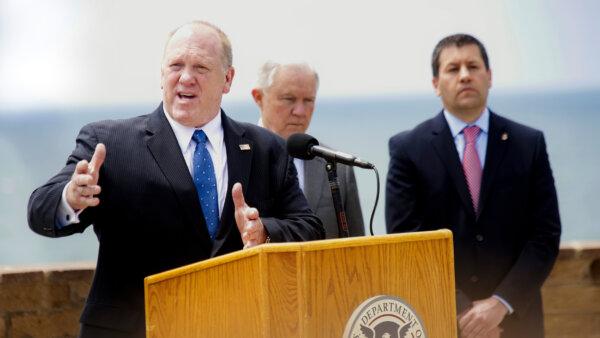A Southern California mayor sounded an alarm on Nov. 25 that complying with federal deportations could violate California’s sanctuary law and put police officers in his city at risk of losing their jobs and their pensions.
Bill Wells, mayor of El Cajon, about 40 miles from the U.S.–Mexico border in San Diego County, claims that city police officers could face misdemeanor charges in California if they cooperate with federal authorities to deport illegal immigrants.
Although El Cajon is not a sanctuary city, California’s sanctuary law prohibits cooperation with federal immigration officers in most cases.
In a social media post on Nov. 25, Wells said his city intends to comply with federal authorities despite the risk but that he hopes to get clarification from state Attorney General Rob Bonta before deportations begin.
“No officer should have to choose between doing their duty and jeopardizing their future,” Wells posted on social media platform X. “As mayor of El Cajon, I’m doing everything in my power to protect our officers and stand against these dangerous [state] policies.”
Wells said the city’s police chief alerted him to the conflict.
“I talked to our chief, who was the one who informed me that the officers themselves were at risk,” Wells told The Epoch Times on Nov. 26.
California officers can lose their police certification and job if arrested for a felony or other crime, according to the California Commission on Peace Officer Standards and Training.
Officers can also lose their state pensions if they are convicted of a felony related to their official duties, according to the state’s retirement system.
California lawmakers passed the California Values Act in 2017—also called its Sanctuary State law or Senate Bill 54—that prohibits law enforcement agencies, including school police and security departments, from using resources to investigate, detain, or arrest people for immigration enforcement.
The law bans law enforcement from asking for a person’s immigration status, detaining a person based on an Immigration and Customs Enforcement agency (ICE) request, arresting someone based on a civil immigration warrant, and participating in any agreements or programs that deputize police as immigration agents.
It also prohibits law enforcement from participating in border patrol activities, including warrantless searches and using federal immigration agents and interpreters.

Tom Homan, former acting director of Immigration and Customs Enforcement, addresses the media at Border Field State Park in San Ysidro, Calif., on May 7, 2018. Homan has been named as President-elect Donald Trump's border czar. (Sandy Huffaker/Getty Images)
The state law allows immigration authorities to interview inmates, but prohibits them from having permanent office space in jails.
When California’s law was enacted, the U.S. Department of Justice filed legal action against the state, former Gov. Jerry Brown, and former Attorney General Xavier Becerra, seeking to stop its enforcement.
“These criminal aliens are subject to removal from the United States under federal immigration law, and SB 54 interferes with federal immigration authorities’ ability to carry out their responsibilities under federal law,” the DOJ claimed in March 2018.
The U.S. Supreme Court declined to grant review of the legal challenge in 2020, allowing two lower-court decisions in favor of California’s sanctuary law to stand.
Wells said in a Nov. 20 social media post that he plans to participate in the deportation process.
“With all the talk of sanctuary cities and states, let me make this perfectly clear: El Cajon is NOT a sanctuary city. We will do everything in our power to assist the federal government in removing criminals from this country,” he stated in the Nov. 20 post.
He reiterated his position on Nov. 26. Wells, who also founded a Mayors for Safe Cities group in 2017, is hoping to meet with Tom Homan, Trump’s former ICE director and his named border czar for his second administration.
“I’m trying to arrange a meeting with myself and Tom Homan and will be asking for the feds to give us some resources to protect ourselves for complying,” Wells said. “It is my intention to find a way to comply with federal law.”
Homan, who does not require a Senate confirmation before starting his new job, would be in charge of the nation’s borders. He has already made public statements about his policy against sanctuary jurisdictions.
Wells said he is drafting a letter to send to California’s attorney general for clarification of the state law and hopes that the City Council will approve it on Dec. 11.
While immigration hasn’t crippled the city, Wells said there are “a lot of people on the streets that we don’t know where they came from.” There has also been an extreme effect on the city’s schools, he said.

In a still from the video, Gov. Gavin Newsom makes an announcement about job creation and California's economy on Nov. 21. Newsom has called for a special session of the state Legislature to prepare for the incoming Trump administration. (Reuters/Screenshot via NTD)
Bonta’s office did not return a request for comment.
A senior official with Gov. Gavin Newsom’s administration told The Epoch Times via email: “SB 54 is about the use of California’s resources and ensuring that they go toward fighting crime in California communities, not toward federal immigration enforcement.
“It does not create any criminal penalties or civil liability for individual officers. Nor does it prevent state and local law enforcement from arresting those who commit crimes in their jurisdiction, regardless of the immigration status of the perpetrators.”














